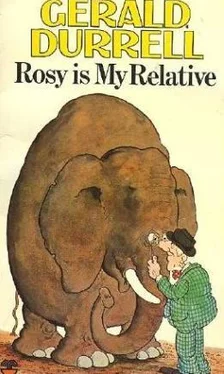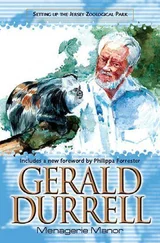“Hi, boy!” said Mr. Pucklehammer, straightening up unsteadily. “Just been having a little sing-song with Rosy . . . she likes a good song. What d’you think of the cart, eh?”
“It’s wonderful,” said Adrian enthusiastically. “You’ve done it beautifully.”
“Always thought I should’ve taken up art,” said Mr. Pucklehammer gloomily, but there’s not much call for it nowadays. Did you get the money?”
“Yes, I got it,” said Adrian. “There were lots of papers and things to sign . . . that’s why I was so long.”
“Well, if I were you,” said Mr. Pucklehammer, pulling out his watch and peering at it blearily, “I’d cut off home and break the news to that Dredge woman.”
“Yes, I suppose I’d better,” sighed Adrian. “In the meantime don’t go and give Rosy too much to drink, will you? You know what my uncle said in his letter.”
“A drop of beer,” said Mr. Pucklehammer severely, “never hurt no one.”
Adrian stepped up to his vast, slumbering protégée and patted her domed head.
“Good night, Rosy old girl,” he said.
Rosy opened one small, mischievous eye and peered at him. She looked almost as though she was smiling, Adrian reflected, as if she knew what the plans for the next day were and thoroughly approved of them. She uttered a tiny squeak, dosed her eyes and went back to sleep, while Adrian left the yard and trudged down the road towards Mrs. Dredge.
As he bad anticipated, Mrs. Dredge proved difficult about the whole thing. She was not at all satisfied with Adrian’s excuse of a dying uncle, and in her efforts to get to the bottom of this she muddied both herself and Adrian up to such an extent that eventually neither of them really knew what the other was talking about. Finally admitting defeat, Mrs. Dredge gave up the attack and allowed Adrian (who now had a splitting headache) to go to bed.
The following morning, his bag neatly packed, he made his way down to the yard. He had spent an uneasy night beset with dreams of enormous herds of intoxicated pachyderms crushing multi-coloured pony traps underfoot, and so was somewhat relieved, on entering the yard, to be greeted by a squeal of pleasure from Rosy, who shambled forward and curled an affectionate trunk round his neck in greeting. Rosy’s natural bonhomie was strangely endearing, thought Adrian. He was beginning to feel quite fond of his giant encumbrance.
With the aid of Mr. Pucklehammer He packed the back of the trap with the things they thought he would need for the journey. There was an assortment of tinned and bottled food for Adrian, three sacks of stale bread for Rosy, blankets, a hatchet, a first-aid outfit full of mysterious and potent-looking potions that belonged to Mr. Pucklehammer, a coil of stout rope, a canvas tarpaulin which, as Mr. Pucklehammer pointed out, was big enough to cover both Adrian and Rosy should it rain, Rosy’s chains, in case it became necessary to shackle her, a firkin of ale, heavily disguised so that Rosy would not know it was there, and last but not least, Adrian’s banjo. This instrument he had purchased some months before, but his progress on it. had been slow, for he could only practise when Mrs. Dredge was down seeing Mr. Dredge at the cemetery. But Mr. Pucklehammer had thought it a splendid idea to take it with them. There was nothing, he explained to Adrian, like music when you were marching along. With music and beer, he insisted, you could get anywhere.
At last they had the trap loaded up and, with a certain difficulty, managed to hitch it up to Rosy who was fascinated by this new game and most cooperative. Then, with Adrian holding the tip of her ear as a guide, they walked round and round the yard several times to get her used to the idea.
“Well,” said Adrian at last, “I suppose we’d better be going. I can’t thank you enough for all your help, Mr. Pucklehammer.”
“Don’t think anything of it, boy,” said Mr. Pucklehammer. “Only wish I was coming too. I bet you’ll have a wonderful time. Now don’t forget to write and let me know how you’re getting on, will you?”
“I won’t,” said Adrian, “and thanks once again.”
Mr. Pucklehammer patted Rosy affectionately on the flank and then flung open the gates of the yard. Rosy lumbered out into the road with Adrian guiding her, the trap rattling and tinkling behind them, and Mr. Pucklehammer stood and watched them out of sight.
Although they took back streets wherever possible, they still bad to traverse a section of the city before they could strike out into the country, and it was in the city that Adrian added considerably to his knowledge of elephants, and the effect they had on life. For example, he soon discovered that horses were apt to have collective nervous breakdowns when suddenly confronted with one. It did not seem to matter whether they were pulling an omnibus or a hansom cab, the result, so far as Adrian could see, was identical. They would utter a piercing whinny, rear up on their hind legs and then gallop off down the road at full speed, with their terrified owners clinging desperately to the reins. Rosy was considerably mystified by this; having been used to sensible, plebeian circus horses whom she considered to be her friends, this lack of enthusiasm on the part of the city horses was puzzling and hurtful, to say the least.
Another item of information that Adrian learnt about elephants—at the cost of a sovereign—was that they eat fruit and vegetables. They had rounded a corner and come face to face with an elderly man pushing a barrow piled high with market produce, at the sight of which Rosy had uttered a gleeful trumpeting and quickened her pace. She took no notice of Adrian clinging to her ear and shouting instructions. Her one thought was for the barrow-load of food so thoughtfully provided by fate. The owner of the barrow, being suddenly confronted by an elephant pulling a multi-coloured cart and bearing down on him with considerable speed, obviously bent on his destruction, turned tail and ran with a speed and agility one would not have suspected possible in one of his years. Rosy, uttering the peculiar roaring, squeaking noise she made when excited, stood by the discarded barrow and—in spite of Adrian’s protests—proceeded to stuff fruit and vegetables into her mouth and chew them with immense satisfaction. While she was thus engaged Adrian had to pursue the barrow owner, calm his shattered nerves and pay for the damage. But at any rate, he reflected, it meant that Rosy had eaten a good meal, and he hoped that this would have a soothing effect on her for the rest of the trip. In this he was right, for Rosy paced along after her meal, her stomach rumbling musically, in a passive haze of goodwill.
Eventually the houses dwindled and fell away, until, when they breasted the top of a hill, the city lay glittering and sprawling behind them, and ahead, brilliant in the spring sunshine, lay the open country, a magical carpet of woods and fields, meandering rivers and misty hills, all ringing with lark song and the drowsy call of cuckoos. Adrian took a deep breath of the clean, clover-scented air.
“Well, there it is, Rosy,” he said. “The country. I think we’re over the worst now, my girl.”
It was only later that he realised that this was the stupidest statement he could have made.
5. THE MONKSPEPPER HOLOCAUST
The sun was hot, the sky a clear blue, and all around them the hedgerows and copses, clad in a frilly green crinoline of swing leaves, were bursting like a musical box full of birdsong. It was wonderful, he decided, to be able to walk along the narrow, leafy lanes, their high banks covered with waterfalls of butter-yellow primroses, with Rosy shuffling through the dust at his side, listening to the clatter and scrape of the pony trap’s wheels, and the pleasant squeaking and jingling of the harness. Presently, he removed his coat and threw it into the back of the trap. Half an hour later his waistcoat, celluloid collar and black tie joined it, and in a fit of wild daring he rolled up the sleeves of his shirt. Now, clad in his black trousers, striped braces and with his bowler hat perched jauntily on his head, he made an arresting sight, but he did not care. He was intoxicated with the sights and sounds of the countryside, and the road to adventure lay beneath his feet.
Читать дальше










